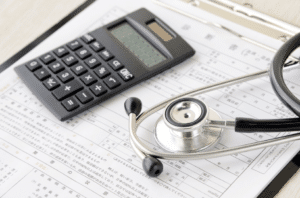Most of you after immediately coming to Japan will probably be issued with a health insurance card – something like in the image above. This heavily subsidizes your healthcare courses and thus it is likely to help you!
That being said, there are some parts of the system which are a bit under-explained, so we wrote this article to clear up some of the doubts!
1. Is it mandatory to get National Health Insurance?
According to the Japanese government all residents must be covered by a public health insurance. So, yes, if you have a residence card and intend to stay for more than 3 months, it is highly recommended to enroll in the Japanese National Health Insurance.
It is important to get National Health Insurance, because without it, you will need to pay very high medical fees in case you get sick. This service is, of course, open to foreigners and you might be able to find English speaking staff to guide you through the registration, depending on where you live.
Enrolling in the National Health Insurance is mandatory from your day of arrival in Japan, which means that when applying, the date of enrolling in the insurance is based on the date of arrival in Japan. If the application is made later, you will be required to pay the past premium for the period from the day of arrival in Japan to the date of the application.
2. How much do I have to pay? Can I pay monthly or do I have to pay everything at once?
The insurance premium has to be paid monthly. What often happens is that a few months after enrolling, you will receive an important-looking envelope in your mailbox filled with strips of paper, which you can use to pay the insurance fees.
The premium varies according to where one lives and one’s income. However, in most cases while you are a student, the premium is about JPY 20,000 per year. It is possible to pay everything at once or receive monthly bills that you can pay by cash at any konbini store.
Once enrolled in the National Health Insurance, you will only need to pay a part of your medical bills. When receiving treatment for injuries or illnesses, you will have to present your insurance card to be eligible for the discount.
3. Where do I get the insurance card from? For how long can I use it? Where do I get a new one as soon as my old one expires?
You can apply directly at the National Health Insurance section at your local ward office/ city hall. You will only need your residence card and passport. An appointment is not necessary. Payment is not needed at the time of enrolment; As stated above, you will receive the bill in the mail, so make sure to provide an exact address!
If you move, you must go to the city office of your new residential area to apply for a new insurance card to be issued. This very important because if this procedure is not made, the National Health Insurance will not be effective.
4. How to make use of the National Health Insurance? How much does it cover?
70% of the cost of all medical fees are covered by the insurance, so you basically just pay 30% of your medical fees.
Cases where the scheme is not applied and you will have to pay 100% of the medical bill:
Extra charged private rooms in hospitals, expensive medicines not listed in the scheme, special treatments such as having a gold tooth put in, baby delivery and abortion.
Over the counter treatments (drug store cold medicine for example) are usually not subsidized unless they are bought under a prescription of a doctor.
Under the following conditions, the majority of the cost will be reimbursed if the claim is approved even after you already paid all the medical fees at the time of treatment:
1) when you are injured in an accident and received a treatment at a hospital which is not under the National Health Insurance scheme, or when you got sick or injured during a trip and received a treatment without submitting an insurance card.
2) attendance expenses for serious illnesses, with the approval of a doctor.
3) acupuncture or osteopathy under the direction of a doctor.
4) expenses for making a corset and a plaster.
5) expenses for blood transfusion.
6) transportation expenses from home to a hospital for a person with a serious sickness.
In addition to that, if an individual’s medical costs for treatment at one hospital exceeds a certain limit, there is a payment system for high-cost medical care where you can apply for a refund of the amount paid over that certain limit. However, it will be not covered for the fee of a doctor’s medical advice at regular outpatient treatments or the cost of a special private room.
Additional detail:
With the National Health Insurance, a woman can receive assistance of 420,000JPY for a delivery. Likewise, the same amount will be given if there is a certificate or proof of miscarriage and premature birth.
In the case of a member’s death, 50,000JPY to 70,000JPY will be given to the person who held the funeral.


